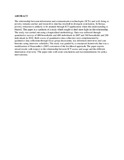| dc.contributor.author | Waema, Timothy M | |
| dc.contributor.author | Okinda, Obadia | |
| dc.date.accessioned | 2014-02-25T08:09:02Z | |
| dc.date.available | 2014-02-25T08:09:02Z | |
| dc.date.issued | 2011 | |
| dc.identifier.citation | Waema,Timothy M.,Okinda,O.,2011.Policy implications of the relationship between ICT access and usage and well-being : a case study of Kenya : research paper. | en_US |
| dc.identifier.uri | http://hdl.handle.net/11295/64938 | |
| dc.description.abstract | The relationship between information and communication technologies (ICTs) and well-being or poverty remains unclear and research to date has resulted in divergent conclusions. In Kenya, poverty reduction is unlikely to be attained through ICT applications when this understanding is blurred. This paper is a synthesis of a study which sought to shed more light on this relationship. The study was carried out using a longitudinal methodology. Data was collected through quantitative surveys of 400 households and 400 individuals in 2007 and 304 households and 288 individuals in 2010. Both waves of quantitative data collection were complemented by qualitative data collection through focus group discussions, key informant interviews and case histories using interview schedules. The study was guided by a conceptual framework that was a modification of Duncombe's (2007) extension of the livelihood approach. The paper reports mixed results with respect to the relationship between ICT access and usage and the different dimensions of poverty. The paper ends with some conclusions and recommendations for policy interventions. | en_US |
| dc.language.iso | en | en_US |
| dc.publisher | University Of Nairobi | en_US |
| dc.title | Policy implications of the relationship between ICT access and usage and well-being : a case study of Kenya : research paper | en_US |
| dc.type | Other | en_US |

